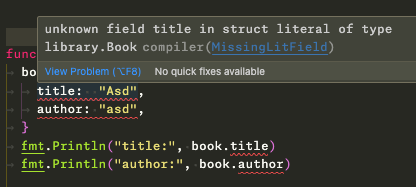Heim >Backend-Entwicklung >Golang >Golang-Struct-Feldzielfernrohre
Golang-Struct-Feldzielfernrohre
- 王林Original
- 2024-08-31 20:30:411272Durchsuche
Strukturfeldbereiche
Exportierte Felder
In anderen Sprachen ähnelt dies dem Qualifikationsmerkmal für den öffentlichen Zugriff.
- Wenn Sie wie ich aus Ruby stammen, wäre dies das Definieren von Attributen mit attr_accessor
Wenn das Feld (d. h. das Attribut) der Struktur mit einem Großbuchstaben beginnt, würde dies bedeuten, dass dieses Feld exportiert wird und somit außerhalb des Pakets zugänglich ist.
Angenommen, wir haben die folgenden Dateien im Go-Projekt:
main.go /library /book.go
Wir würden book.go in einem eigenen Paket definieren.
// library/book.go
// Assume we have a package called "library" which contains a book.
package library
// Struct that represents a physical book in a library with exported fields
type Book struct {
Title string,
Author string
}
Bei Verwendung in main.go:
package main
import (
"fmt"
"library" // importing the package that the struct Book is in
)
func main() {
book := library.Book{
Title: "Book Title",
Author: "John Snow"
}
// Print the title and author to show that the struct Book fields are accessible outisde it's package "library"
fmt.Println("Title:", book.Title)
fmt.Println("Author:", book.Author)
}
In Ruby wäre dies gleichbedeutend mit der Verwendung von attr_accessor, da wir Folgendes können:
- Lesen und schreiben Sie die Attributwerte außerhalb der Klasse
class Book
# allow read and write on the attributes from outside the class
attr_accessor(:title, :author)
def initalize(title = nil, author = nil)
@title = title
@author = authoer
end
end
# usage outside of the class
book = Book.new()
# assinging attributes outside of the class
book.title = "Book Title"
book.title = "Jon Snow"
# accessing attributes outside of the class
puts book.title, book.author
Private Felder
Dies ähnelt den Qualifikationsmerkmalen für den privaten Zugriff in anderen Sprachen
Wenn es mit einem Kleinbuchstaben beginnt, sind die Felder nicht zugänglich.
Probieren Sie es selbst aus!
Angenommen, Ihr Modulname ist myapp in go.mod
// go.mod module myapp go 1.22.5
Wir erstellen eine neue Datei in Library/book.go unter der Paketbibliothek
// library/book.go
// Assume we have a package called "library" which contains a book.
package library
// Fields start with lowercase, fields are not exported
type Book struct {
title string
author string
}
Importieren Sie das Paket in main.go
// main.go
package main
import (
"fmt"
// import the library package
"myapp/library"
)
func main() {
book := library.Book{
title: "Book Title",
author: "John Snow"
}
// Print the title and author to show that the struct Book fields are accessible outisde it's package "library"
fmt.Println("title:", book.title)
fmt.Println("author:", book.author)
}
Wenn Sie Go in VSCode eingerichtet haben, wird in der Zeile der folgende Lint-Fehler angezeigt:
- Titel: „Buchtitel“

unknown field author in struct literal of type library.Bookcompiler[MissingLitField](https://pkg.go.dev/golang.org/x/tools/internal/typesinternal#MissingLitField
Das obige ist der detaillierte Inhalt vonGolang-Struct-Feldzielfernrohre. Für weitere Informationen folgen Sie bitte anderen verwandten Artikeln auf der PHP chinesischen Website!
In Verbindung stehende Artikel
Mehr sehen- Wie analysiert man die Zeit in einer bestimmten Zeitzone mit Go?
- Warum führt der Vergleich von Zeitwerten in Go With „==' zu unerwarteten Ergebnissen?
- Wie generiert man in Golang zufällige Zeichenfolgen mit benutzerdefinierter Länge und Eindeutigkeit?
- Wie integriere ich Go-Funktionen mit GCCGO in ein bestehendes C-Projekt?
- Wie können Sie einen Deadlock in Go vermeiden, wenn Sie WaitGroup und einen Kanal mit begrenztem Puffer verwenden?

